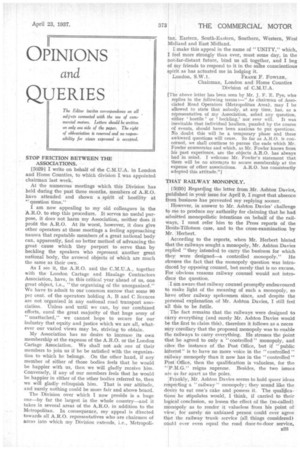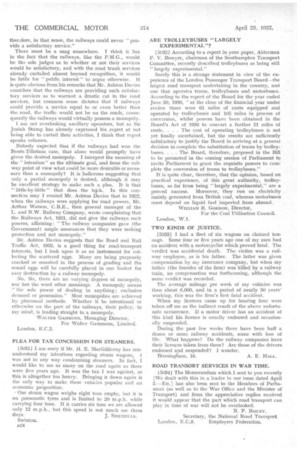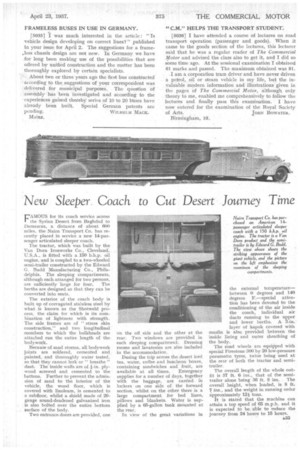OPINIONS
Page 57

Page 58

Page 59

If you've noticed an error in this article please click here to report it so we can fix it.
and
QUERIES
STOP FRICTION BETWEEN THE ASSOCIATIONS.
[50291 I write on behalf of the in London and Home Counties, to which division I was appointed chairman last week.
At the numerous meetings which this Division has held during the past three months, members of A.R.O. have attended and shown a spirit of hostility at "question time."
I am now appealing to my old colleagues in the A.R.O. to stop this procedure. It serves no useful purpose, it does not harm my Association, neither does it profit the A.R.O. At its worst, however, it does give other operators at these meetings a feeling approaching nausea that reputable members of a great national body can, apparently, find no better method of advancing the great cause which they purport to serve than by heckling the speakers who represent another great national body, the avowed objects of which are much the same as their own.
As I see it, the A.R.O. and the C.M.U,A., together with the London Cartage and Haulage Contractors Association, have, in this critical year ahead of us, one great object, i.e., "the organizing of the unorganized." We have to admit to our common sorrow that some 90 per cent, of the operators holding A, B and C licences are not organized in any national road transport association. Unless and until we can, by our combined efforts, enrol the great majority of that huge army of " unattached," we cannot hope to secure for our industry that equity and justice which we are all, whatever our varied views may be, striving to obtain.
My Association has no desire to increase its own membership at the expense of the A.R.O. or the London Cartage Association. We shall not ask done of their members to join us if he be satisfied with the organization to which he belongs. On the other hand, if any member of either of those bodies feels that he would be happier with us, then we will gladly receive him. Conversely, if any of our members feels that he would be happier in either of the other bodies referred to, then we will gladly relinquish him. That is our attitude, and surely nothing could be more fair and above board.
The Division over which I now preside is a huge one—by far the largest in the whole country—and it takes in several areas of the A.R.O. in addition to the Metropolitan. In consequence, my appeal is directed towards all A.R.O. representatives who are chairmen of areas into which my Division extends, i.e., Metropoli tan, Eastern, South-Eastern, Southern, Western, Wesl Midland and East Midland.
I make this appeal in the name of "UNITY," which, I feel more strongly than ever, must some day, in the not-far-distant future, bind us all together, and I beg of my friends to respond to it in the sa-Ine conscientious Spirit as has actuated me in lodging it.
London, S.W.J. FRANK F. FOWLER, Chairman, London and Home Counties Division of C.M.U.A.
[The above letter has been seen by Mr. J. F. 'E. Pye, who replies in the following terms :—" As chairman of Asso-. ciated Road Operators (Metropolitan Area), may I be allowed to state that nobody, at any time, has, as a representative of my Association, asked any question, either hostile ' or ' heckling,' nor ever will. It was inevitable that individual hauliers, puzzled by the course of events, should have been anxious to put questions. ICTo doubt this will be a temporary phase and these awkward questions will cease. So far as A.R.O. is concerned, we shall continue to pursue the ends which Mr. Fowler enumerates and which, as Mr. Fowler knows from his past experience, are the objects A.R.O. has always had in mind. I welcome Mr. Fowler's statement that there will be no attempts to secure membership at the expense of other associations. A.R.O. has consistently adopted this attitude."] THAT RAILWAY MONOPOLY.
150301 Regarding the letter from Mr. Ashton Davies, published in your issue for April 9, I regret that absence from business has prevented my replying sooner.
However, in answer to Mr. Ashton Davies' challenge to me to produce my authority for claiming that he had admitted monopolistic intentions on behalf of the railways, I must refer him to the Press reports of the Bouts-Tillotson case, and to the cross-examination by Mr. Herbert.
According to the reports, when Mr. Herbert hinted that the railways sought a monopoly, Mr. Ashton Davies replied "they intended to carry the business for which they were designed—a controlled monopoly." He stresses the fact that the monopoly question was introduced by opposing counsel, but surely that is no excuse. For obvious reasons railway counsel would not introduce the question.
I am aware that railway counsel promptly endeavoured to make light of the meaning of such a monopoly, so have other railway spokesmen since, and• despite the personal explanation of Mr. Ashton Davies, I still feel all this to be futile.
The fact remains that the railways were designed to carry everything (and surely Mr. Ashton Davies would be the first to claim this), therefore it follows as a neces sary corollary that the proposed monopoly was to enable the railways to carry everything. He stresses the point that he agreed to only a " controlled " monopoly, and cites the instance of the Post Office, but if "public interest" is to have no more voice in the " controlled " railway monopoly than it now has in the " controlled " Post Office, then the qualification is valueless, for the " P.M,G." reigns supreme. Besides, the two issues are as far apart as the poles.
Frankly, Mr. Ashton Davies seems to hold queer ideas respecting a " railway " monopoly ; they sound like the desire to eat one's cake and possess it. The qualifications he stipulates would, I think, if carried to their logical conclusion, so lessen the effect of the (so-called) monopoly as to render it valueless from his point of view, for surely no unbiased person could ever agree that the railway trunk service (all things considered) could ever even equal the road door-to-door service,
therefore, in that sense, the railways could never "provide a satisfactory service."
There must be a snag somewhere. I think it lies in the fact that the railways, like the P.M.G., would be the sole judges as to whether or not their services would be satisfactory, and with the road trunk services already curtailed almost beyond recognition, it would be futile for "public interest" to argue otherwise. It is quite obvious from his remarks that Mr. Ashton Davies considers that the railways are providing such satisfactory services as to warrant a drastic cut in the road services, but common sense dictates that if railways could provide a service equal to or even better than the road, the traffic would not be on the roads, consequently the railways would virtually possess a monopoly.
I am not overlooking ancillary operators, but as Sir Josiah Stamp has already expressed his regret at not being able to curtail their activities, I think that regret speaks volumes.
Nobody expected that if the railways had won the Bouts-Tillotson case, that alone would promptly have given the desired monopoly. I interpret the meaning of the " intention " as the ultimate goal, and from the railway point of view what could be more desirable or necessary than a monopoly? It is ludicrous suggesting that only a partial monopoly is desired, although it may be excellent strategy to make such a plea. It is that " little-by-little" that does -the trick. In this connection may I remind Mr. Ashton Davies that in 1922, when the railways were applying for road powers, Mr. Arthur Watson, C.B.E., then general manager of the L. and N.W. Railway Company, wrote complaining that the Railways Act, 1921, did not give the railways such powers, affirming: "The railway companies gave (the Government) ample assurances that they were seeking protection and not monopoly."
Mr. Ashton Davies suggests that the Road and Rail Traffic Act, 1933, is a good thing for road-transport interests, but I look upon it as an instrument for collecting the scattered eggs. Many are being purposely cracked or smashed in the process of grading and the sound eggs will be carefully placed in one basket for easy destruction by a railway monopoly.
No, Sir, there are no varying degrees of monopoly, nor has the word other meanings. A monopoly means "the sole power of dealing in anything; exclusive demand or possession." Most monopolies are achieved by piecemeal methods. Whether it be intentional or otherwise on the part of the railways, their policy, to my mind, is leading straight to a monopoly.
WALTER GAMMONS, Managing Director, For Walter Gammons, Limited. London, E.C.2.
PLEA FOR TAX CONCESSION FOR STEAMERS.
1.50311 I am sorry if Mr. H. E. MacGillivray has misunderstood my intentions regarding steam wagons; I was not in any way condemning steamers. In fact, I would like to see as many on the road again as there were five years ago. It was the tax I was against, as this is altogether too heavy. Bringing it down again is the only way to make these vehicles popular and an economic proposition.
Our steam wagon weighs eight tons empty, but it is on pneumatic tyres and is limited to 20 m.p.h. while carrying four tons. If it carries six tons we arc allowed only 12 m.p.h., but this speed is not much use these days.J. SME /BILLS.
Swinton.
3324 ARE TROLLEYBUSES "LARGELY EXPERIMENTAL"?
[5032] According to a report in your paper, Alderman P. V. Bowyer, chairman of the Southampton Transport Committee, recently described trolleybuses as being still "largely experimental."
Surely this is a strange statement in view of the experience of the London Passenger Transport Board—the largest road transport undertaking in the country, and one that operates trams, trolleybuses and motorbuses. According to the report of the Board for the year ended June 30, 1936, " at the close of the financial year under review there were 61 miles of route equipped and operated by trolleybuses and 105 miles in process of conversion, whilst powers have been obtained in the Board's Act of 1936 to convert a further 51 miles of route. . . The cost of operating trolleybuses is not yet finally ascertained, but the results are sufficiently satisfactory to justify the Board in arriving at a feneral decision to complete the substitution of trams by trolley buses. . . . The Board, therefore, proposed in the Bill to be promoted in the coming session of Parliament to invite Parliament to grant the requisite powers to complete the conversion of trams to trolleybuses."
If is quite clear, therefore, that the opinion, based on practical experience, of this great authority, trolley buses, so fax from being "largely experimental," are a proved success. Moreover, they run on electricity mainly generated from British coal, whereas motorbuses must depend on liquid fuel imported from abroad.
WILLIAM R. GORDON, Director, For the Coal Utilisation Council.
London, W.1.
TWO KINDS OF JUSTICE.
[5033] I had a fleet of six wagons on claimed tonnage. Some four or five years ago one of my men had an accident with a motorcyclist which proved fatal. The verdict was accidental death. The victim was a railway employee, as is Ids father. The latter was given compensation by my insurance company, but when my father (the founder of the firm) was killed by a railway train, no compensation was forthcoming, although the same verdict was recorded.
The average mileage per week of my vehicles was then about 6,000, and in a period of nearly 50 years' working, this was the firm's first fatal accident.
When my licences came up for hearing four were taken off me as the indirect result of the above unfortunate occurrence. If a motor driver has an accident of this kind his licence is usually endorsed and occasionally suspended. During the past few weeks there have been half a dozen or more railway accidents, some with loss of life. What happens? Do the railway companies have their licences taken from them? Are those of the drivers endorsed and suspended? I wonder.
Birmingham, 16. A. E. HALL.
ROAD TRANSORT SERVICES IN WAR TIME.
[5034] The Memorandum which I sent to you recently [We dealt with this in a leader in our issue dated April 2.—En.] has also been sent to the Members of Parliament (as well as to the War Office and the Minister of Transport) and from the appreciative replies received it would appear that the part which road transport can play in time of war will not be overlooked.
R. P. BAILEY, Secretary, the National Road Transport London, E.C.3. Employers Federation.
FRAMELESS BUSES IN USE IN GERMANY.
[5035] I was much interested in the article : " Is vehicle design developing on correct lines?" published in your issue for April 2. The suggestions for a frameJess chassis design are not new. In Germany we have for long been making use of the possibilities that are offered by unified construction and the matter has been thoroughly explored by certain specialists.
About two or three years ago the first bus constructed 'according to the suggestions of your correspondent was • delivered for municipal purposes.. The question of assembly has been investigated and according to the • experiences gained thereby series of 10 to 20 blises have already been built. Special German patents are pending. WILHELM MACK. Mainz.
" C.M." HELPS THE TRANSPORT STUDENT: [5036] 1 have attended a course of lectures on road transport operation. (passenger and goods). When it came to the goods section of the lectures, this lecturer said that he was a regular reader of The Commercial Motor and advised the class also to get it, and I did so some time ago. At the sessional examinatiOn I obtained 61 marks and passed. The maximum obtained was 81.
I am a corporation tram driver and have never driven a petrol, oil or steam vehicle in my life, but the in-Valuable modern information and illustrations given in the pages of The Commercial Motor, although only theory to me, enabled me comprehensively to follow the lectures and finally pass this examination. I have now entered for the examination of the Royal Society
of Arts. 'cum BOWATER. Birmingham, 10.,




























































































